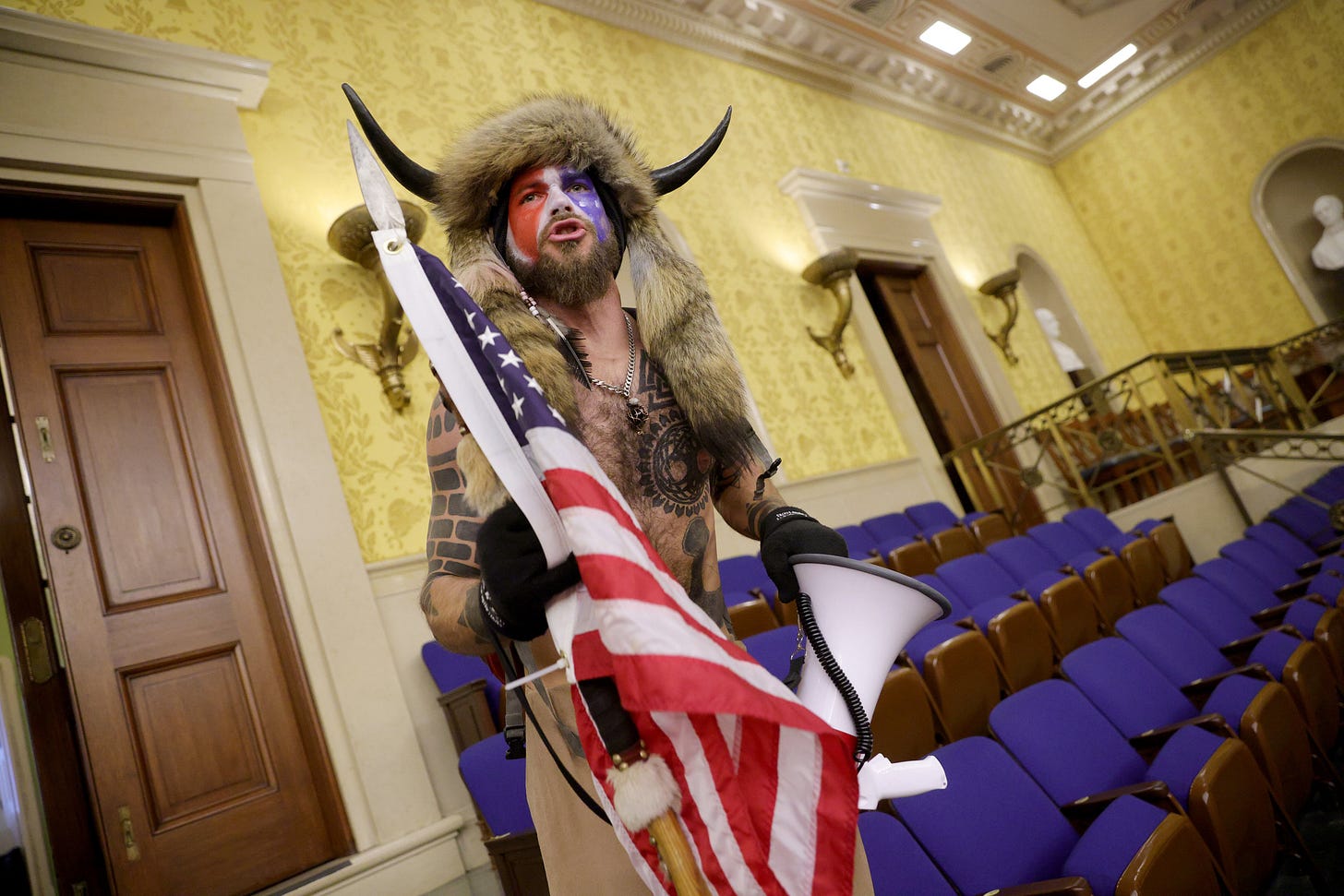The Narcissists’ Coup
How has the U.S. come to resemble an emerging democracy more than the greatest, oldest example of it in the world?

A few days ago, a Libyan friend asked me, “Will Joe Biden really become President of the United States?”
Until recent years, I would have been a bit arrogant in responding. I would have felt it was like asking an Italian if they have good pasta. You're suggesting a weakness in our democracy? It's our best-known product. But by January 1st, this had become a question it was at least conceivable to ask. We had become a lot more like Libya than we were before Trump.
And that was before the Trumpist putsch today.
From 2002 to 2012, I spent a lot of time visiting Afghanistan and Libya. People in both countries love to vote. So, they would seem to accept the philosophical basis of democracy. However, they are less keen on accepting the results if the opposition wins. They like the action of voting but don't understand the culture behind voting.
Libya has been engulfed in a civil war since 2014 for this reason. For much of this time they have had two establishments, each claiming to be the legitimate government. They have what I call “democracy until the other side wins.” Afghanistan has “democracy until my cousin asks a favor.” Neither is the same as the rule of law.
On an individual level, almost no Libyan official will accept his dismissal until he is physically blocked from entering his office or they change the locks. That is why there have been as many as three men at the same time claiming to be head of the Libyan Investment Authority (LIA), and often two men (yes, it's always men) claiming to be Libyan diplomats in the same posting. These officials always have an excuse for why they should stay, and usually it's pretty convoluted, but that doesn't bother them.
The issue in Libya is confusing legalism with the rule of law. It is what philosophers call a category mistake, like walking around Oxford’s campus, looking at individual buildings, and asking, “but where is the university?” The answer is that Oxford University is the sum total of colleges, administrative buildings, laboratories, libraries, sports facilities, and so on.
The rule of law is a way of life. Libyans have had hardly any experience of this way of life. As a result, what they're doing is understandable, to an extent.
What’s America’s excuse?
As many have pointed out, the problem is not Donald Trump, it's much of the Republican Party and the 74 million Americans who voted for Trump, almost all of whom still seem to stand by him today. Those 74 million people had might as well be living in what is called an emerging democracy where you put your cockamamie ideology or your family loyalties above the rule of law.
For almost two-and-a-half centuries, American identity included living under the restraints of our Constitution—not as a burden but as a badge of honor. So how did we become a country where half our citizens don't understand the glory of living under the rule of law?
We lost our pride in living under the rule of law, just as we have lost our acceptance of living under other restraints. This pride eroded, along with trust in government, but also with many other conventions. It's been some time since our culture valued any sort of deference, including to scientific expertise or to the vulnerable. (You see both in the right-wing response to the pandemic, which has cast doubt on the work of scientists while also suggesting a few hundred thousand people dying is merely the cost of doing business.)
Enacting one’s narcissism became the only rule, and, as Stuart Schneiderman said, narcissism is always enacted at someone else’s expense. We elected a president who acts like a big baby. Those who voted for him said things like “it was time to shake things up” and “I'm tired of political correctness” and “I'm tired of being told what to do.” They wanted to let their id out. They were tired of hypocrisy.
But Trumpism is not the opposite of political correctness; both are aspects of the same illness. The collective sickness we’re suffering from is an inability to see oneself as one person among others with no larger or smaller claim on the universe’s attention. The desire to force one's opinions and preferences on the rest of the world is just the mirror image of the desire to burn it all down. Neither one shows a respect for freedom. Polarization is not the problem in the United States right now so much as the selfishness that generates it. Freedom is only possible when both sides realize that it’s possible for others to disagree with them—and occasionally you’re going to be on the losing side of that disagreement. A respect for the feelings of others makes freedom possible. Sometimes it looks like what adolescents call hypocrisy.
The putschists in their infantile cosplay getups are devotees of narcissistic self-expression. When some of them referred to Congress as “our house” they didn't mean that metaphorically; they literally put their feet up on the desks. That's something only children and boors do. It is too soon to really absorb the events of today, but the corrective to the riot in the Capitol will include a return to the civility of classic liberalism. Let’s hear it for restraint, mutual respect, and pride in following rules.
And let us hope for justice under the law for those who perpetrated the events of today.

